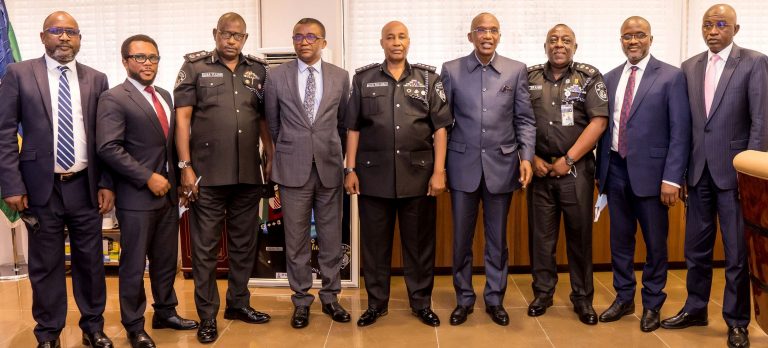Photo caption: From left, Sa’ad Ahmed, Head, Inter-Governmental Department, Asset Management Corporation of Nigeria (AMCON); Jude Nwauzor, the Corporation’s Head of Corporate Communications Department; Baba Tijjani, Deputy Inspector-General of Police (DIG) Operations, Force Headquarters Abuja; Albert Nwanozie, Head, Legal Department, AMCON; Usman Alkali Baba, the Inspector General of Police (IGP); Ahmed Kuru, Managing Director/Chief Executive Officer, AMCON; Zanna M. Ibrahim, DIG Logistics & Supplies, Force Headquarters; Aliyu Kalgo from the office of AMCON MD, and Usman Abubarkar, Head, Enforcement, AMCON in a group photograph at the end of the visit by the AMCON management to the IGP on Tuesday.
Nigeria’s Inspector-General of Police (IGP), Usman Alkali Baba, on Tuesday noted the need for the Asset Management Corporation of Nigeria (AMCON) to partner all police formations across the country in its determination to recover the estimated N5tr debt owed by some recalcitrant debtors, especially now that it is at a very critical stage of enforcements.
The IGP spoke in when the Managing Director/Chief Executive Officer of the corporation, Ahmed Lawan Kuru led some members of his management team to pay him a courtesy visit at his Abuja office.
Alkali Baba who acknowledged the strategic importance of recovering the huge debt to the economy pledged that the police would as always offer necessary support, recalling that when AMCON was first created, the police authorities told its officers and men to give it all of the support, being the lead government agency in the maintenance of internal security.
He assured the visitors that the police under his leadership will continue to provide the much-needed support to AMCON, assuring that the directive needed to be resuscitated. According to him, “like I said, I remember when AMCON was created, we were told that whenever AMCON calls for support, we (the Police) must support them as a lead agency of the government in charge of internal security. All we need is a letter from AMCON.
“We need to resuscitate that directive nationwide to all the AIGs and CPs to support AMCON within the ambit of the law so that the agency can continue to carry out their debt recovery effort, which is challenging because some of your debtors from experience go to court to challenge your activities just to waste time not because they will win the case. So, AMCON needs the police because as long as AMCON is concerned, it will continue to have litigations and enforcements that would require the backing of the police for execution.”
He however also assured that the police under his watch would remain as professional as possible, stressing that in seeking the support of the police, AMCON should fulfil all requirements of the laws of the land so that his officers and men would have the full cover of the law whenever the police is confronted during enforcements on obligors.
Speaking earlier, Kuru recalled the 2008/2009 global financial crisis that led to the creation of AMCON by the Federal Government because at the onset of the financial crisis, there were foreign portfolio withdrawals of credit lines and investments from Nigeria. With that, he reminded the IGP of how the stock market collapsed leading to loss of about 80 percent of its value.
With all these crises and the need to protect the financial sector in the country, the AMCON Bill passed in 2010 by the National Assembly was signed into law by the President on July 19, 2010. In May 2015, AMCON Act Amendment Bill was signed into Law by former President Goodluck Jonathan and in July 2019, President Muhammadu Buhari signed the AMCON (Amendment No. 2) Act, 2019 into law as well.
According to him, the assignment of AMCON is nationalistic and therefore requires the support of all, particularly law enforcement, which is why the AMCON boss asked the IGP to strengthen the police AMCON task force.
Continuing, Kuru reminded his host that “the police is critical to our recovery effort through enforcements and so on. We have been able to recover over N1.4trillion and more than 60 percent has been due to enforcements because our obligors will not willingly come to us for repayment. So, this is a national assignment, which we cannot achieve without the support of law enforcement agencies.








